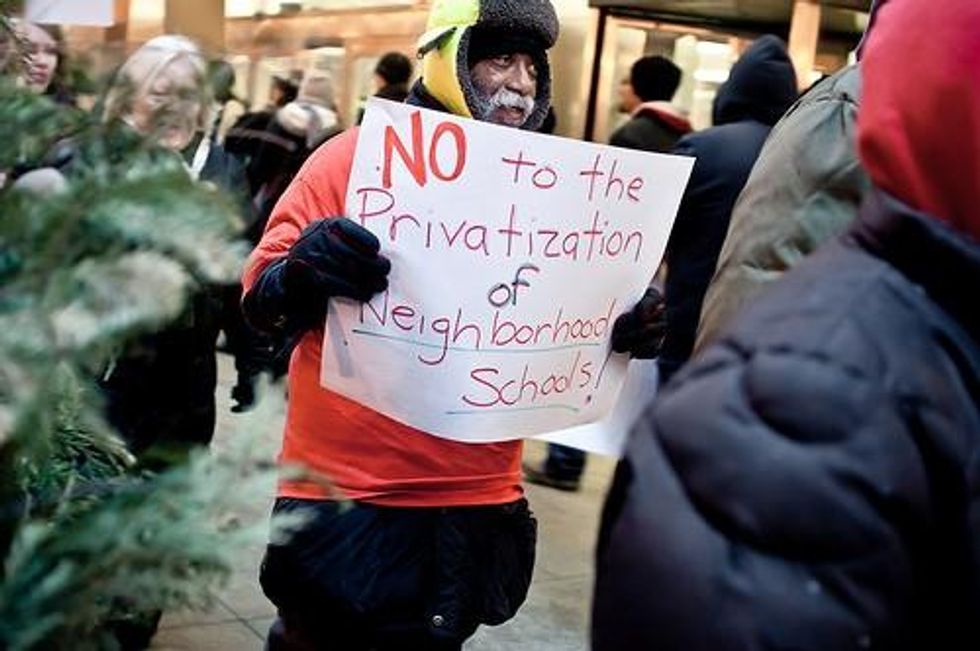Last month, the Walton Family Foundation, led by heirs to the Wal-Mart fortune, announced an $8 million grant to StudentsFirst, headed by Michelle Rhee, the ousted chancellor of the Washington, D.C. school system. This grant came on top of the $3 million the foundation had already donated to the group since 2010.
Rhee's tempestuous tenure as head of the DC schools between 2007 and 2010 left behind a legacy of alleged cheating on standardized tests, a demoralized teaching staff with high turnover, and an increased achievement gap between low- and upper-income children. Soon after she left that job, she started StudentsFirst, which is now based in Sacramento, and has operations in 18 states. It recently donated $350,000 to LAUSD school board races, backing candidates who support its agenda of high-stakes testing, private charter schools, and school vouchers. Nicholas Lemann's devastating profile of Rhee in the current issue of the New Republic exposes her misguided and hypocritical educational agenda.
Rhee has become the public face and top salesperson of a growing corporate-backed effort to privatize America's public schools. They view Los Angeles as ground-zero. Some of America's most powerful corporate plutocrats -- including Microsoft founder Bill Gates, LA business mogul Eli Broad, New York City Mayor Michael Bloomberg, media mogul Rupert Murdoch, and the Walton family -- are using LA's schools as a laboratory for their view of educational "reform." They think public schools should be run like corporations, with teachers as compliant workers, students as products, and the school budget as a source of profitable contracts and subsidies for textbook companies, consultants, and others engaged in the big business of education.
They are part of an interconnected network of wealthy corporate leaders and philanthropists (including local billionaires like Eli Broad, Jerrold Prenchio, and Peter and Megan Chernin) who have funded think tanks, advocacy groups, and political campaigns to promote their agenda. In Los Angeles, they have bankrolled the Coalition for School Reform, LA's Promise, Parent Revolution, and the Los Angeles Fund for Public Education -- all front groups designed to sell their version of school reform.
The Walton Family Foundation calls itself "the largest private investor in education reform initiatives," having made over $1 billion since 2005 to organizations that support school privatization, charters, and vouchers. In addition to StudentsFirst, these include the Milton Friedman Foundation for Education Choice and the Alliance for School Choice, where Walton family member Carrie Walton Penner (granddaughter of Wal-Mart founder Sam Walton) sits on the board. In 2006, her husband, Greg Penner (who serves on Wal-Mart's board), spent $250,000 to oppose a statewide ballot initiative that would have created a universal preschool system to give California's children a much-needed leg up in early education. It also would have created thousands of good jobs for preschool teachers.
As a business chain, Arkansas-based Wal-Mart has spent a fortune -- in philanthropy and campaign contributions -- trying to break into the Los Angeles retail market with its low-wage retail stores. But the Walton family is also trying to use that fortune to bring Wal-Mart-style education to Los Angeles.
Since 2000, the Walton family -- none of whom live in Los Angeles -- has poured more than $84 million into campaigns, candidates, political action committees and institutions which support privatization. They have donated to charter schools and organizations that support them, such as Green Dot Schools, ICEF schools, and the Los Angeles Parent Union, as well as candidates or political action committees which support diverting tax dollars away from public schools to charter schools. LA already has more charter schools than any other district in the country.
The Waltons want to turn public schools into educational Wal-Marts run on the same model of corporate-style "efficiency." They want to expand charter schools that compete with each other and with public schools in an educational "market place." They want to evaluate teachers and students like they evaluate new products -- in this case, using the bottom-line of standardized test scores. Most teachers will tell you that over-emphasis on standardized testing turns the classroom into an assembly line, where teachers are pressured to "teach to the test," and students are taught to define success as answering multiple-choice tests. Not surprisingly, the billionaires want their employees -- teachers -- to do what they're told, without having much of a voice in how their workplace functions. That means destroying the teachers' main line of defense against arbitrary management -- their union. Rather than treat teachers like professionals, they view them as the hired help. But they have an entirely different set of standards when it comes to judging charter schools.
In fact, there's little evidence that private charter schools and vouchers -- the Waltons' two big obsessions -- are effective at boosting students' learning outcomes. A 2009 study by the Center for Research on Education Outcomes at Stanford University discovered that only 17 percent of charter schools provided a better education than traditional public schools. Thirty-seven percent actually offered children a worse education. In other words, on balance, charters make things worse, even though many of those schools "cream" the best students from regular public schools.
If the Waltons really wanted to make positive change in children's educations and lives, they would steer far clear of Rhee and her troublesome track record. There's a better solution to the difficulties facing urban schools -- one where the Waltons could easily take the lead and have an incredible impact.
Many studies show that parents' incomes are the best predictor of students' academic performance, which results in a wide "achievement gap" between affluent and low-income students. Wal-Mart contributes to this gap. It is not only the nation's largest private employer, with well over 1.3 million employees, but it also has the largest number of poverty-level jobs in the country. The Waltons could end to the company's longstanding practice of keeping its employees in poverty, with low wages, poor benefits, and unpredictable schedules that make parenting even harder than it already is.
If instead of funneling their fortune into failed movements like StudentsFirst, Wal-Mart and the Waltons paid their workers a fair wage, they could improve the lives and economic standing of Walmart employees and their children. Paying a living wage at Walmart would be a much more effective "education reform" strategy - one that would lift working families out of poverty while improving educational outcomes for our children.



